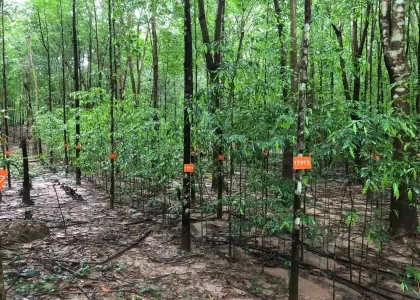Agarwood, a highly valuable resinous wood derived from the Aquilaria tree, has gained international acclaim for its rich scent and use in perfumes, incense, and traditional medicine. In Assam, India, a state rich in biodiversity and natural resources, agarwood farming is becoming a significant economic activity. The cultivation of agarwood is not merely an agricultural endeavor; it is a transformative force in rural communities, reshaping livelihoods, fostering sustainable practices, and promoting community development.
The Economic Impact of Agarwood Farming on Rural Assam
Agarwood farming offers a promising economic opportunity for the rural populace of Assam, often struggling with limited income options. The increasing global demand for agarwood products has led to a surge in its cultivation, contributing to job creation and enhancing local economies. Farmers who previously depended on subsistence agriculture are now shifting to agarwood farming, which provides higher returns on investment. This transition is particularly significant in regions where traditional crops fail to yield adequate profits due to climate variability and market fluctuations.
The economic benefits extend beyond individual farmers to encompass entire communities. As agarwood cultivation requires specialized knowledge and skills, it has encouraged the establishment of training programs and cooperatives. These initiatives foster collaboration among farmers, allowing them to share resources, knowledge, and market access. Consequently, the aggregation of small landholdings into cooperatives enables economies of scale, enhancing bargaining power and driving better prices for agarwood. Local businesses, such as nurseries and equipment suppliers, also thrive, creating further economic opportunities within the region.
Moreover, the agarwood industry has the potential to attract investment and develop infrastructure in rural Assam. As the demand for agarwood continues to grow, stakeholders, including government agencies and private investors, are recognizing the need for improved supply chains and processing facilities. Roads, storage units, and transportation networks are being developed to facilitate the movement of goods, which not only aids agarwood farmers but also benefits other sectors. Thus, the economic impact of agarwood farming in rural Assam is multi-faceted, bringing about transformative changes that uplift the overall standard of living.
Sustainable Practices and Community Development in Assam’s Agarwood Sector
Sustainability is a critical consideration in agarwood farming, particularly given the ecological sensitivities of Assam’s diverse ecosystems. Farmers are increasingly adopting sustainable practices that not only ensure the viability of their crops but also protect the surrounding environment. Techniques such as intercropping, agroforestry, and organic cultivation are becoming prevalent, helping to maintain soil health, reduce chemical dependency, and promote biodiversity. These practices align with global calls for environmentally responsible agriculture, paving the way for a more sustainable future.
Community development is intrinsically linked to the sustainable practices being adopted in the agarwood sector. As farmers embrace new cultivation techniques, they are also becoming more aware of the social and environmental implications of their work. This newfound consciousness is fostering a sense of community stewardship, where individuals are encouraged to participate in local conservation efforts and sustainable resource management. Furthermore, awareness campaigns and workshops on sustainable agarwood farming have strengthened community bonds, enabling collective action towards environmental and social goals.
The integration of sustainability into agarwood farming has also facilitated the development of local governance structures. With the rise of farmer cooperatives, communities are now better equipped to advocate for their rights, access resources, and engage with policymakers. These cooperative movements empower local voices in decision-making processes, ultimately leading to more equitable and community-driven development. As rural Assam continues to embrace agarwood farming, the synergy between sustainability and community development promises to create a resilient and prosperous future for its inhabitants.
Agarwood farming is transforming the economic landscape of rural Assam by providing new opportunities for income generation and community development. This emerging sector not only bolsters the local economy but also fosters sustainable agricultural practices that are environmentally conscious. The implications of agarwood farming extend beyond mere economic advancement; they encompass the empowerment of communities, the promotion of sustainability, and the enhancement of social structures. As Assam continues to cultivate this valuable resource, the positive impacts on rural life are expected to grow, showcasing the potential of agriculture as a driver of change.




